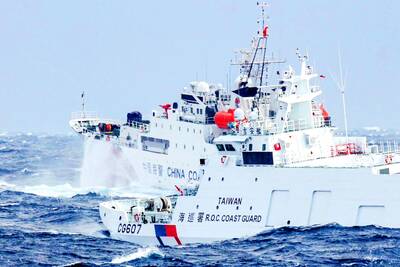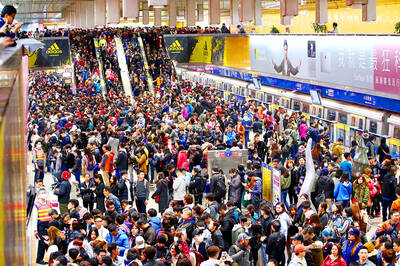The democratization of one country can ignite a wave of democracy in the region, President Chen Shui-bian (陳水扁) said yesterday, stressing Taiwan has the obligation to share its democratization experience with the world's emerging democracies.
Chen made the remarks at the first annual Global Forum for New Democracies held by the Ministry of Foreign Affairs, the Presidential Office and the Taiwan Foundation for Democracy in Taipei.
The forum was attended by five former heads of states from four continents and addressed the challenges and achievements of emerging democracies.
Chen said democratization was a road riddled with setbacks and successes, citing the recent political upheavals in Pakistan, Thailand and Kenya.
However, he said, in contrast to the chaos in other young democracies, Taiwan and South Korea have managed to hold major elections without violence, despite the high levels of controversy surrounding the elections.
He accused the Chinese Nationalist Party (KMT) of stifling transitional justice by repeatedly blocking legislation concerning retrieving its stolen party assets, believed to be worth more than NT$600 billion (US$18.6 billion).
The president called for full disclosure of state-sanctioned violence and other wrongs that occurred during the KMT regime. Although telling the truth can damage one's image, it is a crucial factor in achieving forgiveness and reconciliation, he said.
Francisco Perez, who was president of El Salvador from 1999 to 2004, said democracy was only as strong as its weakest link.
Without prosperity and security, he said, the people who once fought for democracy will revert to supporting the institution's greatest enemy -- populism.
Federick Willhem de Klerk, who was president of South Africa from 1989 to 1994 and whose work in ending apartheid won him a Nobel Peace Prize, said a true democracy must be equipped with an independent judiciary, a clear balance of powers between the legislature and the executive branches and an objective media.
Many former leaders shared the view that an unbiased media is a key factor in promoting and maintaining democracy.
Former Polish president Lech Walesa, another Nobel Peace Prize laureate, who is making his 11th visit to Taiwan, said any democratic government must establish a legal framework that ensures civil rights, while the public must learn what their rights are.
However, he said, the expansion of democratic values in a country also depends on the "thickness of people's checkbooks."
Kim Yong-sam, president of South Korea from 1993 to 1998, told the forum that a true democratic leader is someone who humbly follows public will without seeking to exploit the public.
He said political parties must represent the concerns and needs of the public.
Emil Constantinescu, president of Romania from 1996 to 2000, said an advanced democratic society is characterized by "political complexity, political inclusion, a functional market and a wide dispersion of richness, education, power and authority."
He said that citizens in a democratic country should have access to organizations that support and encourage diversity.
Former Bulgarian president Zhelyu Zhelev had to cancel his appearance because of inclement weather at Sofia Airport. Former Mexican president Vincente Fox canceled his attendance at the request of his government, as Mexico is engaged in talks with Beijing on stopping shoe dumping.

READY: The CGA said it closely monitored China’s maritime exercise, deployed vessels to shadow the Chinese ships one-on-one and set up emergency response centers Chinese navy and coast guard ships have returned to China, signaling the end of a massive maritime exercise, authorities said yesterday. The Coast Guard Administration (CGA) released images it said showed Chinese vessels sailing north in rough seas past Taiwan on Thursday, on their way to China. “All the Chinese coast guard went back to China yesterday, so although they have not officially made any announcement, we consider it over,” CGA Deputy Director-General Hsieh Ching-chin (謝慶欽) said. Beijing has not confirmed the drills and the Chinese Ministry of National Defense did not say whether the maneuvers had taken place when asked at a

People can take the Taipei MRT free of charge if they access it at Nanjing Sanmin Station or Taipei Arena Station on the Green Line between 12am and 6am on Jan. 1, the Taipei Department of Transportation said on Friday, outlining its plans to ease crowding during New Year’s events in the capital. More than 200,000 people are expected to attend New Year’s Eve events in Taipei, with singer A-mei (張惠妹) performing at the Taipei Dome and the city government’s New Year’s Eve party at Taipei City Hall Plaza, the department said. As people have tended to use the MRT’s Blue or

PUBLIC TRANSPORT: As some roads would be fully or partially closed, people are advised to take the MRT, with services expanded to accommodate more riders This year’s Taipei Marathon, which has obtained its first gold label certification from World Athletics, is to be held from 5am to 1pm tomorrow and would have 28,000 participants. The race is to start from the Taipei City Plaza and would go through major roads throughout the city, with traffic control implemented from 6am to 2pm, officials said. The Taipei Mass Rapid Transit (MRT) system and New Taipei City MRT Circle line would start operating at 5am on the day of the race, they said. The race would cover Renai Road, Xinyi Road, Hangzhou S Road, Aiguo east and west roads,

Taiwanese professional baseball should update sports stadiums and boost engagement to enhance fans’ experience, Chinese Professional Baseball League (CPBL) commissioner Tsai Chi-chang (蔡其昌) told the Liberty Times (sister paper of the Taipei Times) in an interview on Friday. The league has urged Farglory Group and the Taipei City Government to improve the Taipei Dome’s outdated equipment, including relatively rudimentary television and sound systems, and poor technology, he said. The Tokyo Dome has markedly better television and sound systems, despite being 30 years old, because its managers continually upgraded its equipment, Tsai said. In contrast, the Taipei Dome lacked even a room for referees